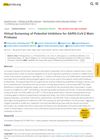 June 2023 in “Antioxidants”
June 2023 in “Antioxidants” Lipids from Schizochytrium sp. help prevent hair loss by protecting hair cells from damage and promoting hair growth.
 June 2022 in “Al- Anbar Medical Journal”
June 2022 in “Al- Anbar Medical Journal” COVID-19 can cause skin problems.
 52 citations,
January 2022 in “Current Research in Pharmacology and Drug Discovery”
52 citations,
January 2022 in “Current Research in Pharmacology and Drug Discovery” New treatments for COVID-19 show promise, but more effective antiviral drugs are needed.
34 citations,
July 2020 in “Dermatologic Therapy” Searches for acne, hair loss, and eczema increased during COVID-19, while searches for other skin issues decreased.
26 citations,
June 2020 in “The Journal of Allergy and Clinical Immunology In Practice” A patient developed a severe skin reaction and died after taking hydroxychloroquine for COVID-19.
 25 citations,
August 2021 in “Irish Journal of Medical Science (1971 -)”
25 citations,
August 2021 in “Irish Journal of Medical Science (1971 -)” COVID-19 infection can significantly cause temporary hair loss.
 16 citations,
November 2020 in “PLOS ONE”
16 citations,
November 2020 in “PLOS ONE” Your lifestyle and health can affect your chances of getting COVID-19; not enough sleep, lots of exercise, and hair loss can increase risk, while washing hands, eating fruit daily, and taking vitamins A and C can lower it.
 12 citations,
September 2022 in “Foods”
12 citations,
September 2022 in “Foods” Some nutraceuticals may help in COVID-19 prevention and treatment, but more research is needed.

The document concluded that certain compounds might strongly bind to and potentially inhibit a key SARS-CoV-2 protein, but further testing is needed.
 5 citations,
December 2021 in “Scientific Reports”
5 citations,
December 2021 in “Scientific Reports” Age affects how certain proteins involved in COVID-19 infection are expressed in mice, but sex hormones and heart injury do not.
 3 citations,
May 2023 in “Frontiers in Public Health”
3 citations,
May 2023 in “Frontiers in Public Health” Most severe COVID-19 patients in Mexico experienced long-lasting symptoms that worsened their quality of life.
 3 citations,
August 2021 in “Clinical, Cosmetic and Investigational Dermatology”
3 citations,
August 2021 in “Clinical, Cosmetic and Investigational Dermatology” Teledermatology was popular among young adults and women, and high-resolution photos improved service during the pandemic.
3 citations,
June 2011 in “Journal of acupuncture and tuina science/Journal of Acupuncture and Tuina Science” Acupuncture is more effective than medication for treating alopecia areata.
 2 citations,
September 2022 in “Cureus”
2 citations,
September 2022 in “Cureus” Almost half of COVID-19 patients in Makkah, Saudi Arabia experienced increased hair loss, especially women and those with chronic diseases.
2 citations,
October 2020 in “Journal of Pharmacy And Bioallied Sciences” Hydroxychloroquine and chloroquine are not recommended for COVID-19 treatment due to insufficient evidence and safety concerns.
 1 citations,
October 2022 in “Cureus”
1 citations,
October 2022 in “Cureus” Over half of the participants in a Saudi Arabian survey experienced hair loss after COVID-19, affecting women and younger people more, with a small percentage feeling a severe impact on their lives.
 1 citations,
September 2022 in “Journal of Medical Case Reports”
1 citations,
September 2022 in “Journal of Medical Case Reports” Rehabilitation therapy helped a severe COVID-19 patient regain muscle mass and return to normal life.
 March 2024 in “Skin research and technology”
March 2024 in “Skin research and technology” New dermoscopic criteria accurately diagnose and grade the severity of hair loss in androgenetic alopecia.
 December 2023 in “PubMed”
December 2023 in “PubMed” COVID-19 patients in Thailand typically started losing hair about 30 days after infection, with women experiencing more severe hair loss.
 December 2023 in “Clinical, cosmetic and investigational dermatology”
December 2023 in “Clinical, cosmetic and investigational dermatology” The new method combining dermoscopy and Reflectance Confocal Microscopy is more effective for evaluating vitiligo.
 May 2023 in “British Journal of Dermatology”
May 2023 in “British Journal of Dermatology” COVID-19 can cause long-term skin problems and has changed how skin doctors work.
 February 2023 in “Vaccines”
February 2023 in “Vaccines” COVID-19 may harm male reproductive health and lower testosterone levels, potentially affecting fertility and causing erectile dysfunction. More research is needed.
 January 2023 in “Theranostics”
January 2023 in “Theranostics” Mechanical force is important for the first contact between skin cells and hair growth in mini-organs.
 November 2022 in “Medicina”
November 2022 in “Medicina” COVID-19 may cause temporary hair loss due to the body's immune response.
 July 2022 in “Conjeturas”
July 2022 in “Conjeturas” Androgens play a key role in causing alopecia by changing the hair growth cycle.
 April 2022 in “International journal of respiratory and pulmonary medicine”
April 2022 in “International journal of respiratory and pulmonary medicine” People with lower levels of free testosterone tend to have worse COVID-19 outcomes.
 April 2022 in “Journal of biotechnology and strategic health research”
April 2022 in “Journal of biotechnology and strategic health research” COVID-19 infection may cause hair loss a few months after recovery.
 November 2020 in “Journal of Bioengineering and Technology Apllied for Health”
November 2020 in “Journal of Bioengineering and Technology Apllied for Health” COVID-19 affects multiple body systems and complicates treatment; accurate testing is crucial.
 January 2017 in “Journal of Cosmetics, Dermatological Sciences and Applications”
January 2017 in “Journal of Cosmetics, Dermatological Sciences and Applications” Chinese women's hair gets thinner and grayer with age, and scalp conditions change, especially after 40.
297 citations,
December 2005 in “Journal of controlled release” P-SLN nanoparticles effectively deliver podophyllotoxin to the skin.
























